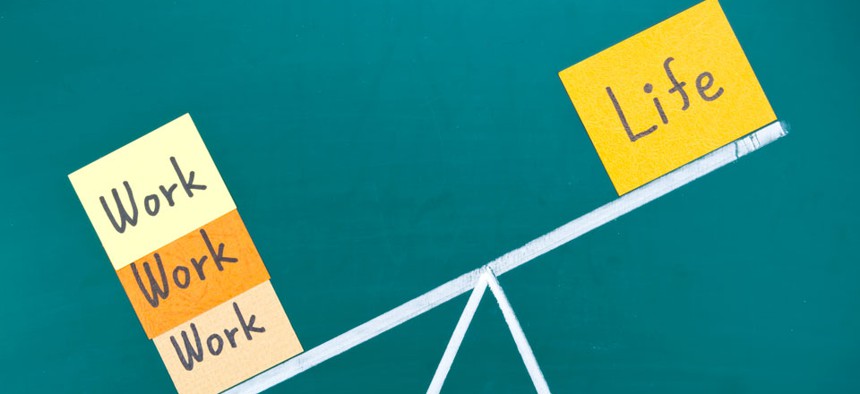
Anson0618/Shutterstock.com

Greatist is the fastest-growing fitness, health and happiness media start-up. Check out more wellness news at Greatist.com.
Although “work-life balance” is hardly a new concept, employees everywhere continue to debate how best to achieve it. For millennials, a generation that’s grown up with smartphones and can work remotely even from vacation in the Adirondacks, perhaps the better question is whether work-life balance is even possible.
In the debates around managing personal and professional responsibilities, the only certainty is that no single technique works for everyone. The key is finding out what’s most important to you -- in your career as well as in your personal life -- and making sure you prioritize it in your daily schedule. The tips below are designed to help 20- and 30-somethings (or anyone) navigate the beginning stages of their careers without letting health, relationships, and happiness fall by the wayside.
WHAT’S THE DEAL?
As the American workforce becomes increasingly mobile, the line between our work and our personal lives is often blurred. Nearly half of American workers have jobs suitable for part-time or full-time telecommuting (aka working from somewhere outside the office). That means more people are checking work email at the dinner table and typing up project reports in their pajamas. In fact, the physical separation between our work and our personal lives (aka an office building) may be somewhat outdated. One survey found that as many as 70 percent of college students believe it’s unnecessary to be in an office regularly.
For younger workers, these relaxed boundaries may actually be desirable. When they look for a job, many millennials say flexibility (in terms of where and when they work) is especially important. That’s possibly because employees in this age bracket want the freedom to develop relationships and pursue personal hobbies. Research suggests millennial workers place a higher value on being able to spend time with friends and family than baby boomers (people born between approximately 1946 and 1964) did when they were younger. Likewise, millennials are less likely to define themselves by their careers.
But flexibility in the form of having constant access to work email and never technically “clocking out” for the day can have some negative repercussions. Research suggests it’s important to take breaks from professional demands and to recover from a busy workweek in order to reduce stress.
Unfortunately, there’s no one “right” approach to balancing work-related and personal commitments. For those worried about whether, where, or how to draw the line between work and play, follow the practical steps below to create a life that’s all-around fulfilling.
YOUR ACTION PLAN
Sometimes achieving a better balance between work and the rest of our lives is a matter of tweaking our ’tude, like accepting that we can’t do or have everything. Other times the solutions are simple (keeping better records of how you actually spend your time or relocating the laptop outside the bedroom). Whatever your challenges with work-life balance, these 15 tips are bound to help you enjoy every day to the fullest.
1. Pick and Choose
One of the hardest parts of achieving work-life balance is recognizing that we’ll never have it all. That is, we’ll never make it to every social event while also working extra hours and making home-cooked meals every night. Once you’ve decided which responsibilities and relationships you find most important (see No. 2), it’s all about prioritizing. So cut yourself some slack when it comes to other achievements in your personal and professional life, and remind yourself that you’re making progress where you believe it really counts.
2. You Do You
The definition of work-life balance varies pretty widely between individuals. Instead of trying to conform to someone else’s lifestyle, figure out what’s personally meaningful to you, whether that’s developing a relationship with a new partner or working toward a promotion at a new job (or both). As long as you find your life fulfilling, it doesn’t matter if your schedule looks different from someone else’s.
3. Be Open to Change
Even once you’ve searched your soul to figure out what truly matters to you, accept that those priorities might change over time. Maybe you’ll start a family, take a new job, or pick up a new hobby — whatever the situation, be prepared for your values and schedule to shift, and make adjustments accordingly.
4. Accept Imperfection
Let’s say you’ve established that friendships are the most important aspect of your life right now. That still doesn’t mean you need to freak out if you miss your BFF’s boyfriend’s birthday bash because you’re working late on a big project. Know that you’ll make mistakes and that obstacles and challenges will pop up unexpectedly. Instead of feeling like a terrible person, try to enjoy yourself, and be productive and present with whatever you’re doing. Then refocus on your main priorities as soon as possible.
5. Take It Day by Day
One clever tip is to combine your work and personal calendars so you don’t necessarily prioritize one set of responsibilities over the other in advance. Each day, you can decide whether the staff meeting is more important than getting lunch with an old high school buddy, or vice versa.
(Image via Anson0618/Shutterstock.com)






